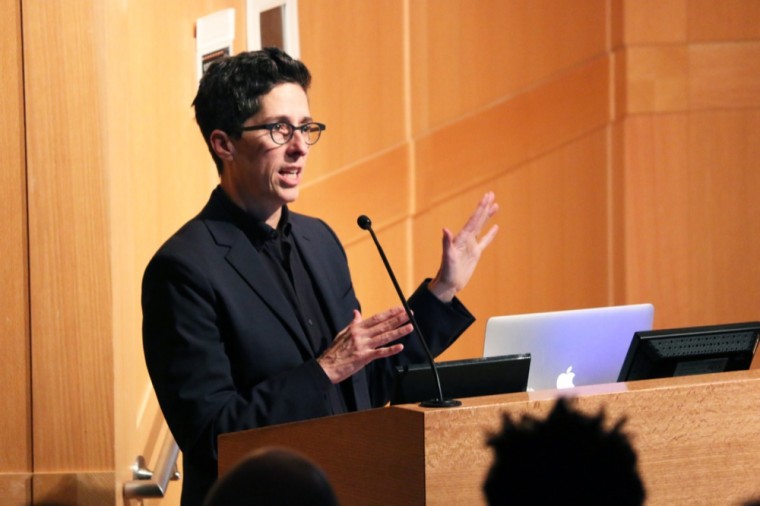News
Cartoonist, ‘Fun Home’ author Alison Bechdel draws full house
Best-selling author Alison Bechdel spoke about her creative process and life’s journey through art and writing Tuesday evening, which attracted over 250 attendees.
Bechdel is best known for her first book, “Fun Home,” a memoir told as a graphic novel which was turned into a Broadway musical that won five Tony awards this year. She is also the mind behind the “Bechdel test,” a metric often used to determine gender bias in films.
 Allison Hamburg | Student Life
Allison Hamburg | Student Life Alison Bechdel speaks in Whitaker Hall on Tuesday night as part of an event sponsored by the Department of English. Bechdel, a writer, comic and creator of the Bechdel test, reads from her nonfiction work.
Visiting Hurst professor for the English department this year, Bechdel presented the audience with a chronological account of her life and career with the assistance of a slideshow that illustrated her journey as a cartoonist. She provided a look into her creative history though childhood doodles and drawings to her well-known comic strips.
“The stories were just coming to me with no effort; there was no doubt, no deliberation. It’s just this feeling or drawing it or writing it down as it happened. And it was a very joyful feeling,” Bechdel said about her drawing process when she was a child. “My creative process is not like that anymore.”
Bechdel also spoke about her father’s death, which she believes to have been a suicide, and his secret life as a bisexual man. This event was very influential to not only her work, but her own life, feeling as though she had to live out her parents’ “unlived lives.”
“In my father’s case, it was being an openly gay person in New York City; living without shame, secrecy and just being gay,” Bechdel said. “It wasn’t just that I was living that life; it had also kind of become my job, or my mission.”
That mission evolved into “Dykes to Watch Out For,” Bechdel’s famous comic strip that ran for 25 years, in which she represented the lesbian community during a time when being gay still had legal ramifications.
“At the time I was doing this early work, the Supreme Court and most people really thought gay people’s lives were a joke,” she said. “That atmosphere really fueled my work. It felt like, ‘I need to show our real lives, show that queer people were people.’”
Bechdel spoke at lengths about her creative process, mainly for her first book. This book documented the complex relationship with her father as well as her own journey of self-identity as openly lesbian.
“When [my mother] told me she didn’t know how I was going to draw all of this, I didn’t know either,” Bechler said about the moment she told her mother she was going to write this memoir about her father. “I felt both defeated by what she said and it really lit a fire on me, too, and encouraged me to prove her wrong.”
The event also created an opportunity for people to become acquainted with Bechdel’s most recent graphic memoir, “Are You My Mother?” which she showed parts of to the audience.
“I’ve never really heard of her before so I thought she was really cool and funny,” freshman Yola Randrianantoanina said. “I liked seeing her drawings that she said she did nightly.”
Anna Robinson, a librarian at Olin Library, has been a long-time admirer of Bechdel’s work and was ecstatic to hear from her, particularly given her discussion of society’s evolving attitudes towards gay people.
“I think that that’s some really important thing for everyone to continue hearing because it’s gotten to a point where especially for new generations it seems so obvious that we would accept people regardless of their sexuality,” Robinson said. “And so Alison Bechdel has been alive, and doing work, in a really critical time for gay rights.”
The talk concluded in a short Q&A session in which Bechdel answered questions from students, one of which inquired about the popularity of the Bechdel Test. The test originated in a strip of “Dykes to Watch Out For,” in which a character said she refused to see movies unless it featured at least two named women who talk to each other about something other than a man.
“It’s the thing I’m most known for but it’s not like I said, ‘This is the Bechdel test’. Somehow my name got attached to this thing from an old comic I wrote about women trying to find a movie they could go to,” she said. “It’s kind of cool. Even now, 30 years after I wrote that cartoon, it’s kind of more unusual than not to find a movie that passes the Bechdel test.”
